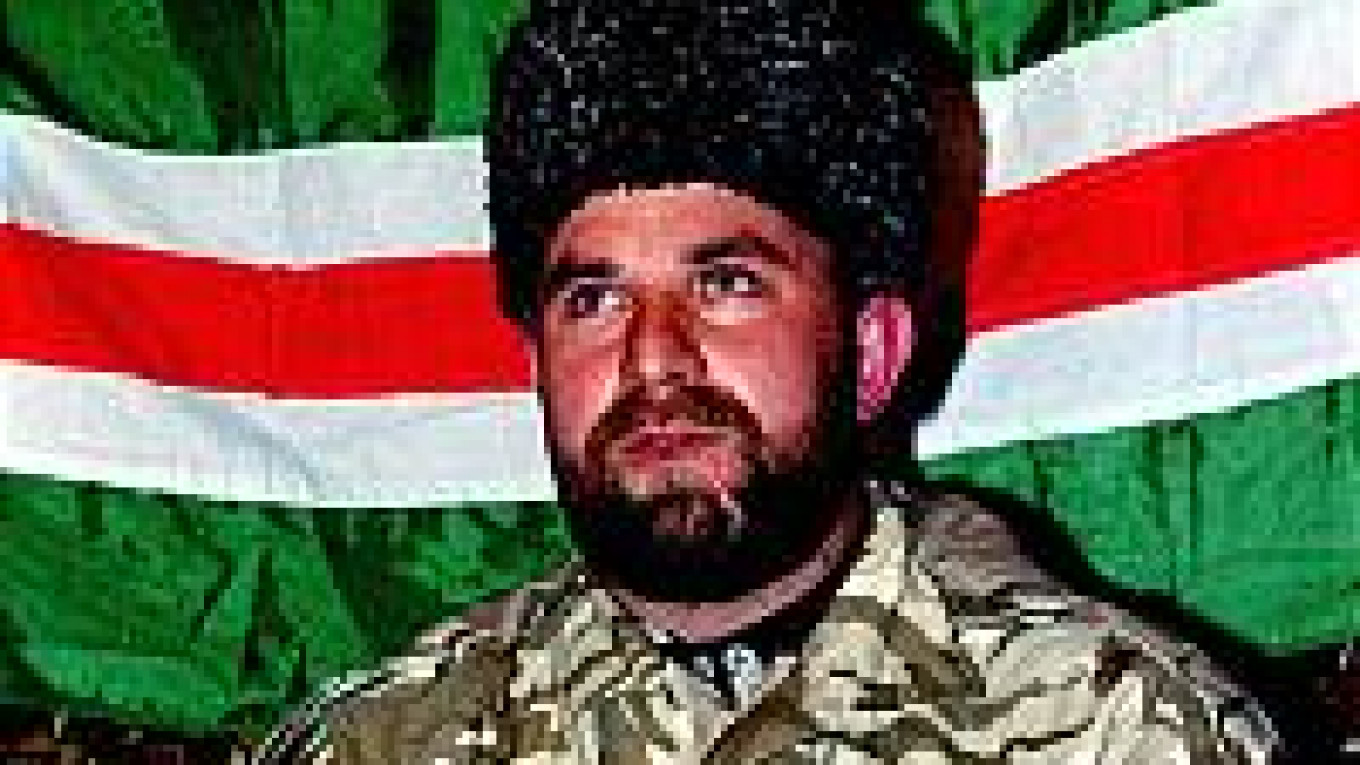Gelayev inexplicably pulled his fighters out of Grozny when the military told rebels to withdraw from the Chechen capital in January 2000, paving the way for the city's recapture by federal forces. Until Gelayev left, the rebels could have indefinitely held off federal troops, according to military experts.
In a baffling decision that handed the military a stunning battle victory later that year, Gelayev stayed put in his hometown of Komsomolskoye on the Chechen plains despite an order by Chechen rebel leader Aslan Maskhadov to move his men into the mountains. Federal forces surrounded the village and killed several hundred rebels before Gelayev managed to escape with a handful of his men.
Last month Gelayev ordered 150 of his fighters to move into Ingushetia -- precisely when Moscow needed fresh evidence of Chechen rebels crossing into Russia from Georgia's Pankisi Gorge to justify threatened strikes. Seventeen Russian soldiers died in an ensuing battle near the village of Galashki late last week.
Chechens who know Gelayev, 38, call him a sharp, independent-minded man with simple ways. They expressed doubt that he works hand in hand with Russian forces, but said perhaps he is unwittingly being manipulated by the secret services.
"Gelayev is a clever man, but he is a peasant and his mentality is that of peasant," said Shamil Beno, who served as foreign minister under first Chechen President Dzhokhar Dudayev.
Gelayev is narrow-minded and would not consent to assisting Moscow, he said.
Sharip Asuyev, a Chechen journalist who has interviewed Gelayev several times, agreed. "I don't think he plays games with the Russian secret services," he said. "But it is quite possible that they use him without his knowledge."
Details about Gelayev's past are sketchy. He has three criminal convictions from Soviet times and once served as defense minister and deputy prime minister in Maskhadov's government. Maskhadov demoted him after the Grozny incident, and Gelayev holed up with his group of fighters in the lawless Pankisi Gorge in the summer of 2000.
A fighter in Gelayev's group told The Associated Press on Tuesday that Gelayev was wounded in the Galashki fighting.
Gelayev is thought to be currently hiding in Chechnya.
"Gelayev is the most independent of all warlords, and he acts separately from rebel leaders Aslan Maskhadov and Shamil Basayev," said Alexei Malashenko, a Chechnya expert at the Moscow Carnegie Center.
He said Gelayev's go-it-alone attitude in comparison to the unity seen between other groups of rebels could make him an easier target of manipulation by security services.
However, he said Gelayev's decision to move into Ingushetia last month could hardly be called the results of skillful work by the security services. Gelayev was probably genuinely afraid of being bombed by Russian planes in Pankisi, and a lack of discipline among Russian border guards made it easy to slip into Ingushetia, he said.
Gelayev's actions in Georgia have puzzled observers. In 2001, he led a raid in Georgia's separatist region of Abkhazia, which wants closer ties with Russia. Gelayev had fought alongside Abkhaz fighters in the republic's drive for independence in 1992-93.
Gelayev's group suffered serious losses fighting Abkhaz troops in last year's raid.
Moscow used the raid as a pretext to start accusing Georgia of supporting Chechen rebels. Georgian President Eduard Shevardnadze told Georgian television last year that Gelayev was "noble" and "an educated man with common sense."
He echoed the statement last month, saying he had seen no proof that Gelayev was a terrorist and that he considers him an "educated person."
Subsequent attacks by Gelayev's men against Russian troops on Chechnya's border with Georgia only increased the Kremlin's resolve.
Maskhadov's representative, Akhmed Zakayev, said Gelayev's moves have nothing in common with the objectives pursued by "official Chechen troops," Kommersant reported Friday.
Until last week's Ingushetia raid, Gelayev would have been the best partner for Moscow in Chechen peace talks, analysts said.
Alexander Iskandaryan, a Caucasus expert at the Yerevan-based Institute of Caucasus Media, said he was convinced that Moscow had been sending negotiators to Gelayev.
Vyacheslav Izmailov, a reporter with Novaya Gazeta and a hostage negotiator in Chechnya, said the Federal Security Service in Grozny had contacts with Gelayev. Gelayev once helped release a hostage, he added.
One of the pet projects of Akhmad Kadyrov, the head of the Moscow-backed Chechen administration, had been to reconcile Gelayev with Moscow.
"Gelayev at the time was able to accept certain compromises that wouldn't ruin his reputation among Chechens," Malashenko said.
However, Kadyrov-sponsored talks with Gelayev folded in early 2001 when Moscow refused to guarantee Gelayev's safety if he laid down his arms.
A Message from The Moscow Times:
Dear readers,
We are facing unprecedented challenges. Russia's Prosecutor General's Office has designated The Moscow Times as an "undesirable" organization, criminalizing our work and putting our staff at risk of prosecution. This follows our earlier unjust labeling as a "foreign agent."
These actions are direct attempts to silence independent journalism in Russia. The authorities claim our work "discredits the decisions of the Russian leadership." We see things differently: we strive to provide accurate, unbiased reporting on Russia.
We, the journalists of The Moscow Times, refuse to be silenced. But to continue our work, we need your help.
Your support, no matter how small, makes a world of difference. If you can, please support us monthly starting from just $2. It's quick to set up, and every contribution makes a significant impact.
By supporting The Moscow Times, you're defending open, independent journalism in the face of repression. Thank you for standing with us.
Remind me later.


